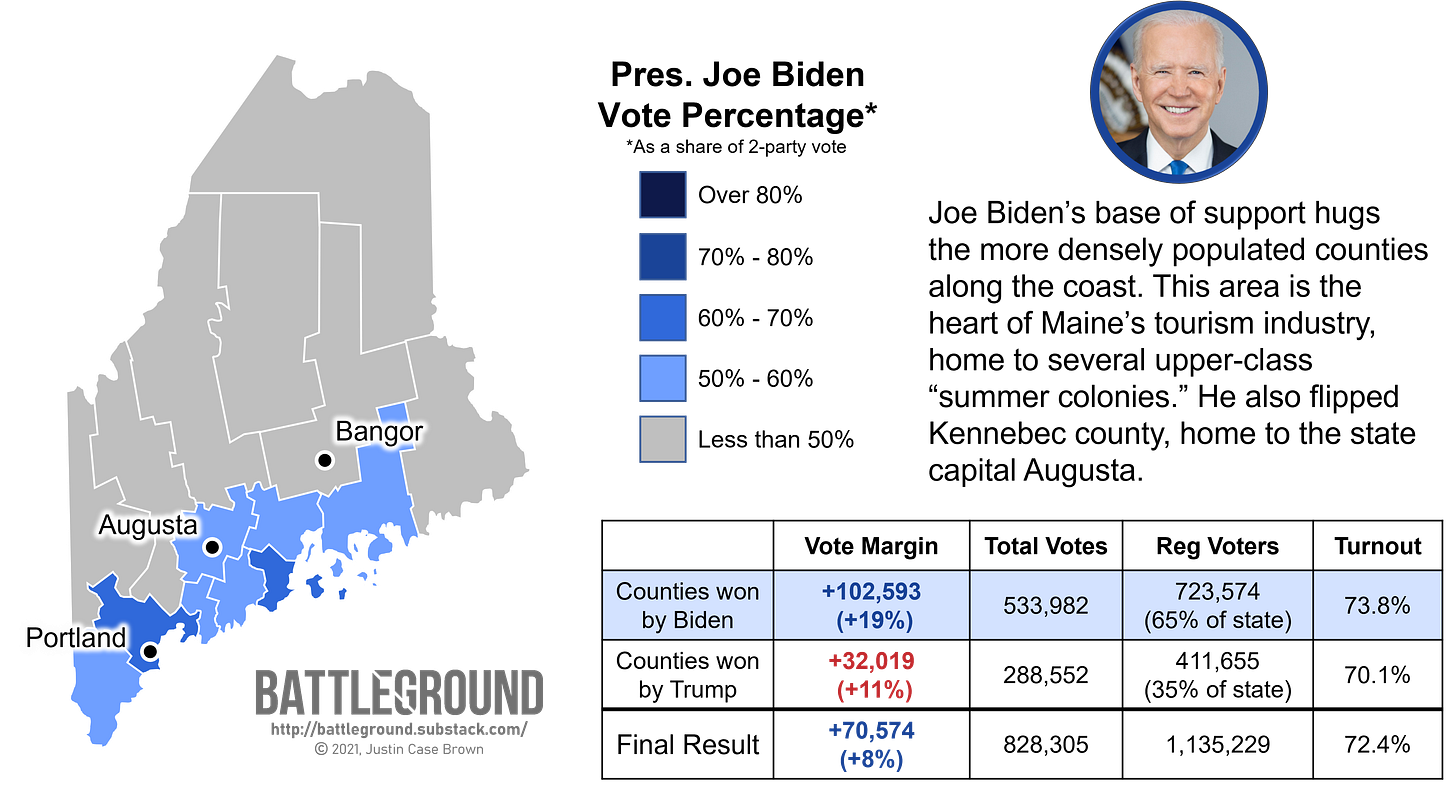Maine: Ranked Choice Voting vs. Ticket Splitting
Yes, the title is a false dichotomy but I'm committed to the headline format!
Topline Takeaways
Joe Biden won Maine by solidifying support in the state’s populous coastal towns.
While Donald Trump lost statewide, he managed to win the state’s 2nd congressional district and one of the state’s electoral votes. He still stands as the only presidential candidate to successfully split Maine’s electoral votes without winning the statewide vote since the 1800s.
A larger than expected amount of Maine voters split their ticket, supporting both Republicans and Democratic candidates on one ballot.
In-Depth Insights
Joe Biden won the statewide vote in Maine by concentrating support in the populous towns along the state’s southern coast. Many of these coastal towns are popular tourist destinations for New Englanders in neighboring states and Portland is both the state’s largest city and its liberal hub.
-Ronald Schmidt Jr., professor of political sciences at the University of Southern Maine.
These coastal towns have a higher concentration of transplants that moved from neighboring states and the populations here are slightly younger than counties in the north. In many of these coastal counties that voted for Biden, there was an informal “Trump line” when looking at the results by township. Biden won nearly every town that sits directly on Maine’s southern coast, in particular the area between the Piscataqua River (which forms the state’s border with New Hampshire) up to Portland on Casco Bay. That support did not penetrate into the landlocked areas of the state as most townships that were at least one or two municipalities inland went for Trump.
In 2016, not a single state had a split outcome, where the president’s party won and a senate candidate of the same party did not. In 2020, there was one state where it happened: Maine. It’s a very odd outcome, given the nature of partisanship these days.” -Dan Shea, chair of the Government Department at Colby College
Despite Trump’s success in Maine’s rural 2nd congressional district, voters here sent a Democrat to represent them in the US House: Rep. Jared Golden. It is estimated that between 15 and 20 percent of Maine voters endorsed candidates from both parties on their ballot.
Rep. Golden has proven to be the Democratic equivalent to Republican Senator Susan Collins: a congressperson who regularly deviates from party-line votes as the voting base he represents is ideologically diverse. In his previous tenure in the US House, he bucked Democratic leadership in his votes against Donald Trump’s first impeachment, Nancy Pelosi’s candidacy as House Speaker and the COVID-19 relief bill. In the 2020 election he was re-elected by 9 points, despite Trump winning the top of the ticket by 7 points in his district. This pragmatic approach to politics appears as the most consistently successful path for campaigns in Maine as voters reckon with the perils of intense partisanship.
“Biden tried to craft a legislative identity that is pretty similar to the one that Sen. Collins tried to craft: A person of the middle who tries to find paths toward compromise.” -Ronald Schmidt Jr., professor of political sciences at the University of Southern Maine.
Forecasting the Future: For the first time in history, a group of American voters used ranked choice voting to pick their president. Maine is the first state to use the voting method for federal elections. The method has a growing cohort of proponents as Alaska and Massachusetts are also considering reforms to institute ranked choice voting for upcoming elections. There are many styles of tabulating ranked choice voting; Maine uses the “instant runoff” method:
While this method of voting is championed by proponents as ensuring that no vote is “wasted,” detractors claim that forcing voters to rank candidates can be too confusing. A graduate researcher at MIT ran several surveys during the 2018 and 2020 election cycles to capture voter sentiments on the new voting method. While ranked-choice voting increased the non-major party vote share (also dubbed “sincere voting”) it also increased the average amount of time it took to cast a ballot. Voters also noted their hesitancy surrounding the more complicated system, highlighting concerns that others may be confused and spoil their ballots. Ultimately, ranked choice tabulation did not affect the final outcome in the presidential election as Joe Biden earned a majority of “first-rank” votes statewide.





